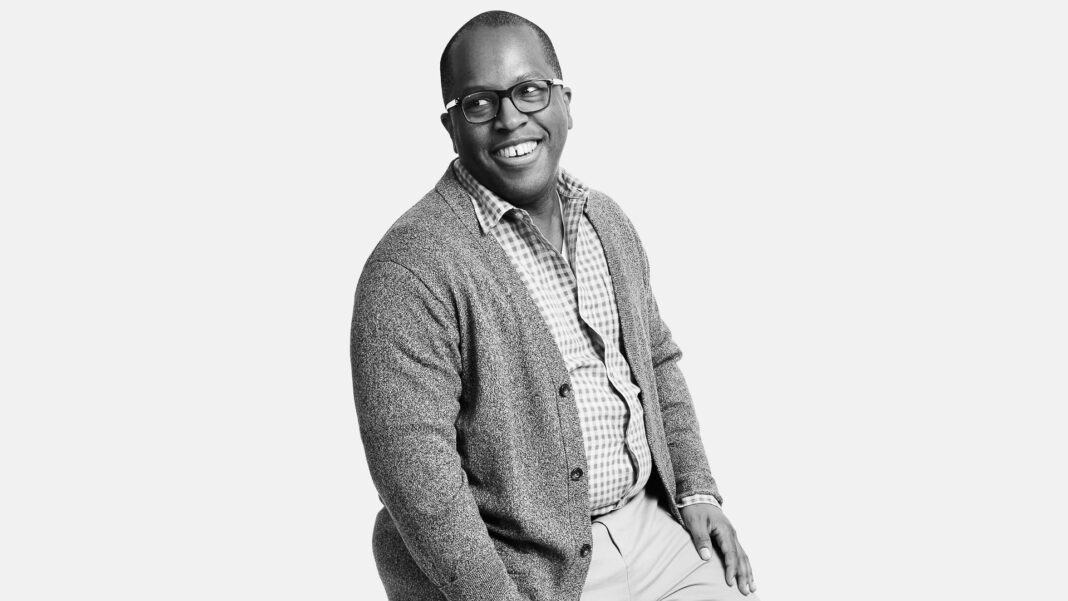It’s probably a loop of its own kind whenever the composer, lyricist and book writer of A Strange Loop gets asked yet again to talk about his Tony Award and Pulitzer Prize winning musical. After all, the show had its first performance over five years ago. There’s nothing like success to bread monotony.

A Strange Loop has opened at the Ahmanson Theatre in Los Angeles where it will play through June 30th. If you haven’t seen A Strange Loop, the musical is about a Black, gay usher (named Usher) working at The Lion King, who writes a musical about a Black, gay usher, working at The Lion King…of course, that’s the easy description.
Jackson did not rest on his laurels. His musical White Girl in Danger ran off-Broadway last spring. His new musical, Teeth, written with Anna K. Jacobs, opened at Playwrights Horizon earlier this year and is transferring to New World Stages this fall.
With A Strange Loop coming to Los Angeles, I knew it would be a challenge to be one of those people asking Jackson questions. I saw the show in New York and loved it, but there were things I wanted to know. Thankfully Jackson agreed to the interview you are about to read.
Of course, what follows are excerpts from our conversation that have been edited for length and clarity. But you can watch the full conversation on the Cultural Attaché YouTube channel.
Q: What has this musical that you’ve given the world taught you over the course of your five year journey, which I know is a much longer journey because you had been working on it for 20 years?
It taught me that persistence is key and that we, as human beings, have a lot more in common than we have not in common. That’s been an interesting sort of lesson to learn each time I encounter the piece out in the world.
While in New York I strongly encouraged a straight couple and their teenage daughter to see A Strange Loop. I wasn’t fully sure how they would respond. They all came out of it loving it because they saw themselves in Usher. Is that the response you hoped for when writing the show?
The show is about a character who is exploring very explicitly his own internal makeup. I feel that when people watch it, they can’t help but do that for themselves. So it’s an exploration of the self. He is a fat, Black gay man. That’s the makeup that he has to work with. That’s not what everybody else’s makeup is necessarily, but they all have whatever their makeup is.
Why do you think the show has resonated the way it has?
I think because the show is very open and very truthful and honest – sort of to its fault lines. It says things out loud that most people don’t really talk about openly, except maybe with an intimate friend or therapist. I think that it gives people permission to wade into certain territory that they wouldn’t ordinarily do in mixed company.
And yet they all end up on their feet at the end of the show.
I think Usher’s journey is a really interesting one where he’s so miserable for so much of it and yet, by the end of it, there’s a brief but amazing moment of self-acceptance. I think that’s a cool change to watch.
You’ve regularly been asked about how autobiographical this show is and I love your response that it’s emotionally autobiographical. Do you think people finally understand that you are not Usher and Usher is not you?
No, I don’t understand that at all. I’ll just keep telling them that until I’m dead in the grave and even beyond then. I’ll keep telling them it’s not autobiographical, but that there’s still many people who won’t believe me.
Why do you think that is? Nobody thinks that. Nobody thinks that Stephen Sondheim is Joanne in Company.
Right? I mean, I think it’s because there is so much about it that is personal. Usher is, you know, a fat Black gay man with a famous name who’s writing a musical. I am a fat Black gay man with a famous name. I never said that it’s not a personal piece or that I didn’t draw from personal experience. I just said it’s not autobiographical because autobiography is a specific genre. It’s a specific form. That’s not what A Strange Loop is. It’s something stranger, frankly. As much as you want to make it be about me, there’s just too many ways in which it isn’t.
If anything, it’s a self portrait. It’s an attempt to capture a kind of experience from the inside. Something that I began when I was about 23 years old. I’m now 43 years old, so I’m literally not the same person. I have a very different life now than I did then.
For the original Broadway production the entire cast was queer-identifying. Is that something that is part of what you want all productions to embrace?
I just saw a production in Boston which was the first regional production of it that wasn’t affiliated with the Broadway production. Everyone in the production identifies as Black. But there was one cast member who I believe was like a Puerto Rican or something. Everybody in that production was queer. Not everybody in this production is. Not everybody in the London production was queer either. But they all rose to the task of the character, of the spirit of the piece. I’m really excited, as it continues to be produced, for companies to decide for themselves what the spirit of the piece is, how they’re going to do that, and who are the people who they’re going to task with honoring the spirit of the piece.
I’m not going to say that I want there to be like an all-straight A Strange Loop or anything like that. But I will say that I believe in performance. I believe in acting. I believe in the material. I think there’s more flexibility in how and who can do that. I’m interested in how far people can push it before it becomes something else.
You went on as Usher for three performances in January of 2023. What your perspective being on stage watching a Broadway house see your show, particularly when it got to the point where you’re doing AIDS is God’s Punishment?
It was a really profound and they were powerful performances for me. I went from having lived the life that I drew from in order to write this piece, to having to then perform the piece and direct that outward. I’m the only person in the history of A Strange Loop who looked at clouds from both sides now. I’d seen it from both vantage points. I felt the loop in both directions. I feel very blessed to have had that opportunity to do that.
Getting to AIDS is God’s Punishment, that song has so many meanings to me, in part because of things that have happened in my life that influenced the writing of it. It was an honor for me to step inside of that and get to literally embody it for those performances.
I don’t know what your perspective was on stage, but I know sitting in the audience when Usher encourages to clap along, I just said, oh no, no, no, there is no way I’m clapping along to this. Did you see people with hesitation? Did you see a divide, people who clap and people who won’t at all?

My favorite part of A Strange Loop is the moment when everyone has to decide what their relationship to the gospel play is. I clap every single time. Every time I see the show, I clapped. It’s my honor to clap. I love it. Some people start and they stop. Some people never start. Some people look around and are angry that other people are clapping. Some people are confused.
But all of those responses are literally what Usher wants. That’s what it feels like to be him. It’s to have conflicted emotions in this sort of musical fantasia. In this hate-filled but beautifully underscored, beautifully sung gospel moment. That’s what it feels like inside of him. He is directing that outward so that people can experience it because he’s been showing you his impression of it the whole time. But until you’re in it, you’ll never know.
There’s a lyric in Tyler Perry Writes Real Life: “I’m into entertainment that is undercover art.” How much does that ideal guide you whether you were creating A Strange Loop or White Girl in Danger or Teeth?
I’m always pushing for entertainment that’s undercover art. That’s the work that I’ve always liked the best. That’s what inspired me. I looked to this as my guiding light and my guiding star as I was honing my craft and learning how to make the work I wanted to make. But that work is not always going to win the box office.
How much do you want to express yourself in a way that is organic and natural to you as opposed to trying to satisfy algorithms or any other formulas that either computers or executives think are the way to make art work?
I’m often thinking about that, about how I don’t want to sell out. I want to honor my artistry. But it’s getting a lot harder. The economics of theater are so, so, so, so, so difficult. I’m often wondering, what do I do? Because it’s not really in me to sell out. I spent so many years perfecting the thing that I do that I don’t just have this other instinct in my back pocket. It doesn’t come naturally to me. I guess that means I have to continue to push my little Sisyphean boulder up the hill and see if I can get it to the top, or if it will press me on the way down.
I read the tweet that you posted on April 8th in relation to Jerrod Carmichael’s reality show. You wrote, “Every act of content creation is an act of content destruction. Stop wasting our time. We have less of it to spend than we think.” I love the idea that every act of content creation is an act of content destruction.

Joni Mitchell has this lyric on her 1972 song Electricity that goes, “I’m out of touch with the breakdown of this century.” That’s sort of how I feel in the content era. Everybody’s on their phone. There’s a meme for every emotion that you could possibly feel or not feel. There’s this constant pressure to broadcast every aspect of your life. I have been very guilty of this, so I’m not at all above it, but I do think that everything about our lives is so disposable. And I just hate that.
I never thought that everything was so disposable growing up when I was reading books or watching movies or TV. Maybe it is, but I’m resistant to that. I want the art that I try to make, I want it to last. I want it to mean something to people and to be something that you can go back to and that it can resonate with you beyond just the moment that you watch a two second clip of it online or a meme. I don’t want to be a meme. For good or for ill, that’s what I’ve been trying to do all these years.
Langston Hughes is quoted as saying, “Perhaps the mission of an artist is to interpret beauty to people, the beauty within themselves.” How has the totality of the experience of A Strange Loop allowed you to accept that you have interpreted your own beauty and how will that inspire you moving forward?
It’s been a real loop roller coaster ride for me because sometimes I would feel like, wow, what a cool thing I’ve made that has shown, as you say, beauty to the world. But then other times I felt like, oh, God, I made something that’s just a vehicle for narcissism and navel gazing. But then I come back to I made something that is a real vehicle for a lot of Black actors to come together, to tell a story of a person trying to find themselves and somewhat succeeding. That feels like a win. So I can only hope that continues. That there’s a will to continue to tell that story and to find artists who want to tell that story as difficult as it is to tell.
To watch the full interview with Michael R. Jackson, please go here.
Main Photo: Michael R. Jackson (Photo by Zack DeZon/Courtesy Center Theatre Group)











[…] Michael R. Jackson Is Not Usher in “A Strange Loop” by Craig Byrd, Cultural Attachéhttps://culturalattache.co/2024/06/13/michael-r-jackson-is-not-usher-in-a-strange-loop/ […]